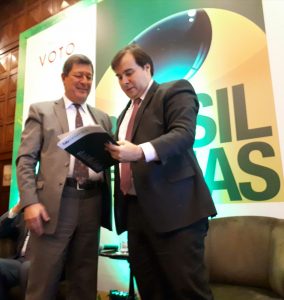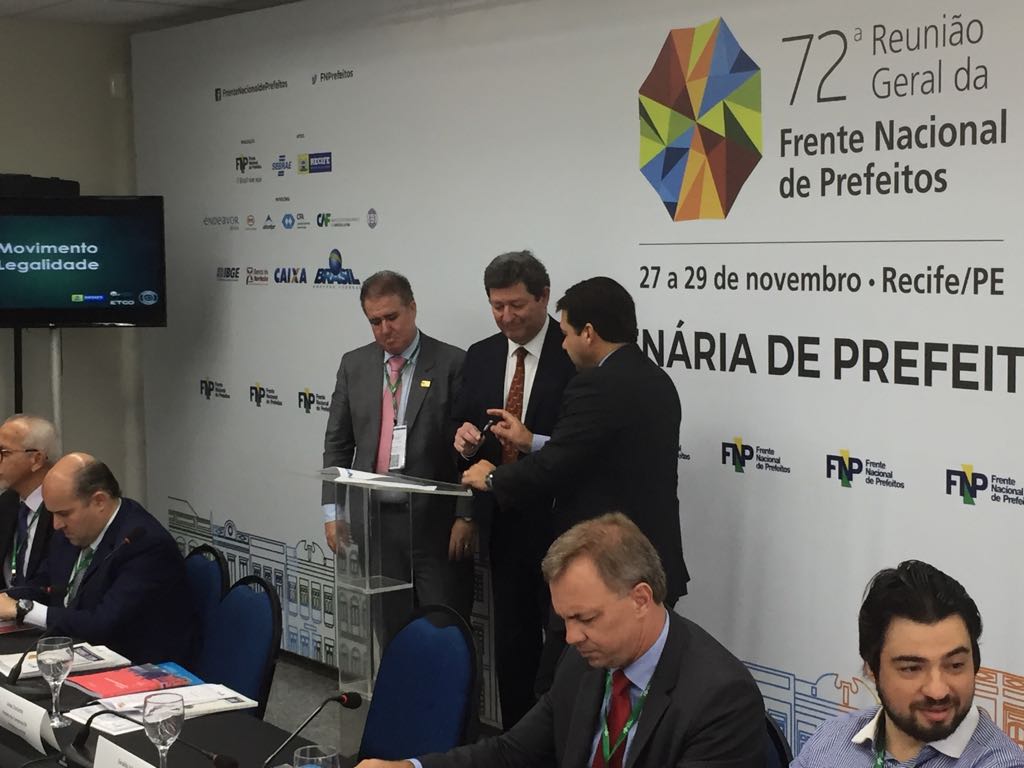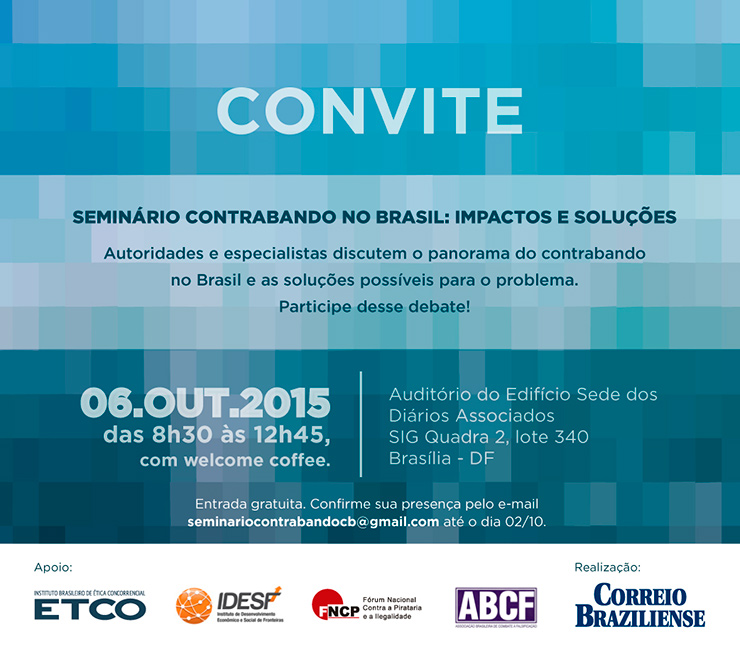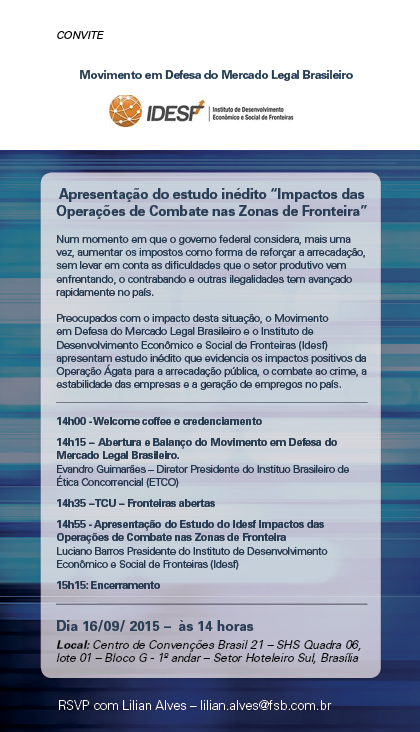Source: Jornal de Brasília (07/05/2018)
Tax fraud is expected to reach R $ 165 billion in 2018. Poor product quality increases losses. Few are punished.
by Jéssica Antunes
jessica.antunes@grupojbr.com
Whether on the stands of the fairs or on store shelves, pirated products gain space in the Federal District. They are counterfeit and smuggled items, which evade taxes and grow without producers, brands and inspection. The Brazilian Association to Combat Counterfeiting (ABCF) estimates that R $ 145 billion in taxes ceased to be collected in Brazil in 2017. It is expected to reach R $ 165 billion this year. Punishment is mild, and recidivism is high. In the capital, the police try to nip the evil in the bud.
The crime of piracy can be classified into two criminal types: violation of copyright or trademark. The first, if there is commercialization, has a penalty of two to four years in prison, but is subject to bail. The second provides for up to one year in prison, and the penalty is usually converted to service provision. According to the Public Security Secretariat, this year there were 22 occurrences related to the two crimes involving the pirate market, with 43 people arrested, according to a preliminary survey by the Civil Police.
The investigation and prosecution of these cases are the responsibility of the Police to Combat Crimes Against Immaterial Property (DCPim). Chief Marcelo Portela says that this type of activity may be related to other crimes, such as bribery of public officials and drug trafficking, for example. Combat is usually done in large operations. “Due to the lack of effectiveness, the actions have to be more certain, detailed and detailed. If there is little ammunition, the shot must be accurate ”.
Most criminals respond in freedom. At the Federal Court of Justice (TJDFT), 179 cases related to intellectual property have been opened since 2016. During the period, 620 were processed and 257 were judged. This year, there have been 21 trials, 171 proceedings and 18 distributions. Most, in all cases and years, refer to copyright infringement.
Historical apprehension
On March 20, the Civil Police made the biggest seizure of pirated CDs and DVDs in the history of the Federal District and dismantled a clandestine factory for mass production of pirated media. Operation Perfídia started at the Imported Fair in Taguatinga and reached a clandestine factory in Itapoã. 30 thousand media, printers, computers and recording towers were seized. At city fairs, backpackers would get up early and line up for supplies.
A woman was caught in the act, but released on bail. According to police officer Portela, she worked with her partner: “They are old people known as distributors. Together, they were arrested 17 times. This time we took the production laboratory ”. According to him, there is the challenge of making operations painful for criminals, "but it is very difficult to stop if it reaches the Judiciary and the person is released".
Sale goes beyond fairs and reaches stores
Counterfeits are produced especially in the Metropolitan Region, but sales take place in broad daylight in illegal and formal businesses in the capital. The concentration is higher in places with high customer movement, such as fairs. Taguatinga has drawn the attention of the police for the marketing of counterfeit or pirated products. A month ago, three regular stores near Feira dos Goianos were booked, and three people caught in the act selling pajamas with Disney designs prints without authorization - considered a violation of trademark rights.
“A self-respecting businessman does not open the door to sell pirated or smuggled goods. I feel obliged to say that this is not a businessman, he is a criminal ”, shoots the president of the Commercial Association of DF, Cléber Pires. He says he has no knowledge of marketing these products in legal establishments and asks that complaints be made. “All piracy immediately affects the local economy. In addition to an affront to society, it causes loss of revenue, job creation, in the production chain ”, he says.
From the point of view of legality, trade and the economy are directly affected. For Adelmir Santana, president of the Federation of Trade in Goods, Services and Tourism (Fecomércio), it is necessary to stimulate customer education. “Often, consumers focus only on costs. But these products are beyond the control of the State, do not pay taxes and the difference is very large. In addition to health risk, the person strengthens the piracy market ”, he says.
Cigarettes on top of smuggling and embezzlement
and ammunition cross the Brazilian borders illegally for smuggling and embezzlement. The estimate is that the illegal trade generates R $ 130 billion in losses to the Brazilian productive sectors annually, but the confrontation comes up against the feeling of impunity and restricted police action due to low personnel.
In Brazil and the DF, Paraguayan cigarettes have a higher volume in smuggling seizures. In the capital, products usually arrive on the roads to the Metropolitan Region, from where the products are distributed. According to the head of DCPim, sales in commercial establishments in the capital are veiled. Last October, a deposit with approximately 15 packs of smuggled cigarettes from Paraguay was found in Ceilandia.
According to the Federal Highway Police, there were more than five thousand items of clothing, one hundred units of cosmetics, 15 boxes of medicines and more than three thousand others not cataloged seized on the federal highways that cut the DF and Entorno in 2017, framed in the two criminal types .
Since 2014, smuggling and embezzlement crimes have been distinguished by Brazilian law. The first consists of importing and exporting prohibited products and is punishable by two to five years in prison. The other deals with the non-payment of taxes for the entry or exit of products, as in the case of buying electronics on international trips, with a maximum penalty of four years. Generally, both are practiced at the same time.
Low feather
Luciano Godoy, lawyer and professor at the Getúlio Vargas Foundation (FGV), points out that smugglers do not feel cornered by the possibility of punishment. “As the sentences are very low, most people do not even serve in a closed regime”, he says. General Secretary of the Association of Federal Judges (Ajufe), Fernando Mendes believes that there are not yet “enough tools to combat macro-crime, and the judicial model contributes to the inefficiency of the result”.
President of the Brazilian Institute of Ethics in Competition (Etco) and of the National Forum Against Piracy and Illegality (FNCP), Edson Vismona does not consider it fair that traders have to pay all fees and compete with those who do not do the same. "It is disloyal," he says.
Learn more
- The smuggled products seized by the Civil Police of the Federal District are passed on to the Federal Revenue Service; counterfeits are available to the courts.
- Those who buy pirated products do not commit crime, but they can face problems. Toys may contain small or loose parts, causing risk to children.
- Anabolics, cosmetics and alcoholic beverages can have harmful components to health. Shoes are of low quality and can cause damage to the spine and knee. Electronics can even explode.
- For a week, Jornal de Brasília asked the Federal Police and the Federal Highway Police for amounts of seizures, but did not receive a return until the closing of this issue. The TJDFT also did not report on the proceedings initiated and the sentences passed.
Tips
- When buying a product, observe the packaging. The counterfeit is never exactly the same as the original.
- Be wary if the advertised price is far below that found in other stores or websites.
- Observe the place where the product is sold, because there are brands sold only by accredited stores.
- Always ask for invoice and guarantee of return and exchange
To access the article in the Jornal de Brasília, click here

















